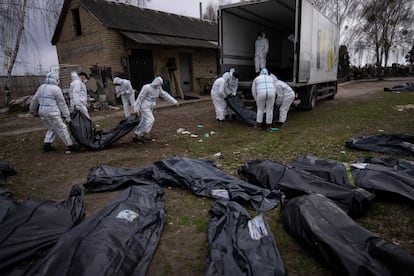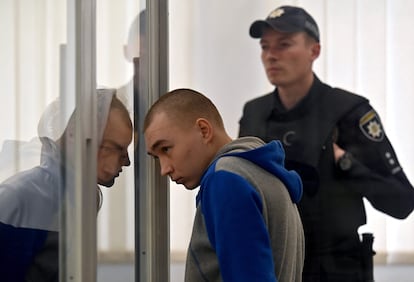Ukraine calls on The Hague to designate Russia a state sponsor of terrorism
Vladimir Putin announces that the mobilization of reservists to shore up the war effort will be completed in two weeks


The Prosecutor General of Ukraine, Andriy Kostin, has called on The Hague to brand Russia a state sponsor of terrorism. Speaking on Thursday at a meeting of Eurojust, an EU agency handling judicial cooperation on criminal matters between member states, Kostin noted that as of last Monday Russia has been engaged in “large-scale missile attacks” against several Ukrainian cities, among them Kyiv, causing at least 17 deaths and 93 wounded, many of them civilian casualties. “This had no military purpose. The goal of Russia’s deliberate attacks is to cause civilian deaths and to destroy civilian infrastructure. Coupled with the intimidation tactics against civilians, it’s a classic act of terror prohibited under international law,” Kostin said. As such, the lawyer and politician believes that now “is the right to time to assess and label the Russian Federation as a state sponsor of terrorism.”
His call came a day before Russian President Vladimir Putin announced that his mobilization of army reservists to shore up the war effort in Ukraine will be completed in two weeks. Putin stated on Friday that the draft he ordered last month had so far registered 222,000 of the 300,000 reservists that Moscow set as an initial goal.
During the Eurojust meeting, it was announced that Romania will join the Joint Investigation Team (JIT) that exchanges information and facilitates the search for evidence of war crimes and crimes against humanity that may have been perpetrated in Ukraine since the Russian invasion was launched last February. Romania is the seventh country to sign up to the JIT after Poland, Lithuania, Estonia, Latvia, Slovakia and Ukraine. The JIT was established in March and supports the work of the International Criminal Court (ICC) at The Hague to open trials against suspected war criminals.
Kostin said that Ukraine is intent on “investigating and trying all of the crimes committed by Russian forces” in the country, as well as those perpetrated against its citizens overseas, in refence to the prisoners of war being held by Russia and “illegally deported adults and minors, particularly children.” According to Kostin, at least 8,000 children have suffered such a fate, although Ukraine believes the real figure “is at least 10 times greater.” The prosecutor general added that to date Kyiv has identified “186 war crimes suspects, the majority of them Russian troops. Forty-five investigations have been referred to judges and there have been 10 convictions.”
Speaking at the Eurojust meeting, Prosecutor of the ICC Karim Khan stressed once again that war crimes “have no statute of limitations and the law must be on the side of the most vulnerable.” Khan added that the ICC has maintained a “permanent presence” on the ground in Ukraine since May with the cooperation of several European countries to “ensure that truth does not become the first victim of war.” Khan added that the ICC remains “steadfast” in its determination that alleged perpetrators of war crimes are brought to justice, either in Ukraine, a third-party country or before an international tribunal.
Accusations of war crimes and crimes against humanity are not easy to uphold, as such Khan stated that the ICC is not working to a fixed timeline. “Credibility is essential and we are making progress, but my office must be in possession of sufficient evidence before making a formal charge,” he said.
Gabriela Scutea, Romania’s Prosecutor General, described his country joining the JIT as “a duty and an opportunity to bring the perpetrators of crimes to justice; it is our obligation to do it as Ukraine’s neighbors, as a large number of Ukrainian refugees have fled to our country.”

War crimes investigations against Russian troops
Eurojust’s President Ladislav Hamran noted that along with the JIT and Ukraine, 14 member countries of the organization have opened their own investigations into alleged international crimes committed in Ukraine. These are of a different legal nature and require coordination, which will be carried out by Eurojust’s databases. Countries are invited to file their findings there to avoid duplication. Eurojust also provides a guide for NGOs and other civilian organizations to cooperate with the initiative.
On Thursday, Ukrainian President Volodymyr Zelensky asked the Council of Europe to take the lead in the establishment of a special tribunal to investigate war crimes committed by Russian troops. It is the ICC’s remit to handle these crimes, as well as crimes against humanity and genocide, that may have been carried out on Ukrainian territory by both sides. Russia does not recognize the ICC and Kyiv has not ratified the Rome Statute, the text that establishes the ICC’s functions and jurisdiction. Ukraine has though allowed the ICC to investigate events in the country since 2014, when Russia annexed Crimea during an insurgency by pro-Russia separatists backed by Moscow.
Tu suscripción se está usando en otro dispositivo
¿Quieres añadir otro usuario a tu suscripción?
Si continúas leyendo en este dispositivo, no se podrá leer en el otro.
FlechaTu suscripción se está usando en otro dispositivo y solo puedes acceder a EL PAÍS desde un dispositivo a la vez.
Si quieres compartir tu cuenta, cambia tu suscripción a la modalidad Premium, así podrás añadir otro usuario. Cada uno accederá con su propia cuenta de email, lo que os permitirá personalizar vuestra experiencia en EL PAÍS.
¿Tienes una suscripción de empresa? Accede aquí para contratar más cuentas.
En el caso de no saber quién está usando tu cuenta, te recomendamos cambiar tu contraseña aquí.
Si decides continuar compartiendo tu cuenta, este mensaje se mostrará en tu dispositivo y en el de la otra persona que está usando tu cuenta de forma indefinida, afectando a tu experiencia de lectura. Puedes consultar aquí los términos y condiciones de la suscripción digital.








































